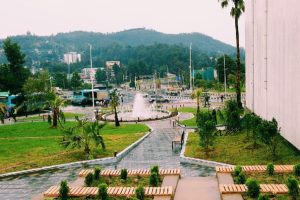
The Southern Nations, Nationalities and Peoples’ State (SNNPS) is the most ethnically and religiously diversified state in Ethiopia. The state is home to 56 diversified indigenous ethnic groups of which Gamo is one of them.
According to the Authority for Research and Conservation of Cultural Heritages, the Gamo people has its own fascinating culture and way of life. Among this, the traditional Gamo Judicial Institution, which is known as Dubbusha is the one.
Dubbusha is a Gamo word which means a traditional public square. It refers to a fenced area where laws and regulations are enacted, amended, sworn in, and reconciliation takes place. The meaning of the word Dubbusha also indicates community’s existing, integrated and developed cultural institution and practice. The venue, which is mostly made of native trees and furnished with a unique set of seats, is a symbol of unity and strength of the people.
The elders sit at the center on the bench-like chair; and disputants and participants often sit under the Dubbusha tree to get protection from the sun. There is also a big stone that has a religious or ritual symbol.
The disputants and the attendants used to sit in front and to the left and right sides of the elders. The accuser and his/her relative take either the right or left side. The accused and his/her family take the other side. No matter which side should be taken by whom. The independent attendants often take in the middle. This helps to avoid an acute quarrel at the place of meeting among the emotionally driven disputants.
In accordance with Gamo’s traditional governance system, the people meet directly with the leader to enact legislation and approve bylaws at Dubbusha. It is a great institution for the society to resolve various disputes and conflicts in a sustainable manner through traditional mediation and reconciliation.
Dubbusha, is also used as a place where elders exchange information about their surroundings, meets to discuss all other societal issues, where thanksgiving and prayers are offered, and cases would be heard. It is also a forum where secretly committed crimes and civil cases are investigated.
As to Gamo Zone Government Communication Affairs Department, Dere Dubbusha, the biggest customary court in a given Gamo community, has two major functions including hearing, discussing and resolving disputes, revising and making laws. In most Gamo communities, the structure of the customary courts has three levels namely Guta Dubbusha, at the village level, Sub-Dere Dubbusha, at the kebele level and Dere Dubbusha at the higher level. Cases would be heard at the Guta Dubbusha level, if not settled referred to the second and third level of the structure.
According to the indigenous belief, Dere Dubbusha is a sacred place where supernatural power exists. It is a place where curses are uttered in its name; justice is delivered; and important assemblies are held. Dubbushas are places where truth prevails.
Misconducts such as telling a lie during Dubbusha assemblies is considered as transgression and taboos which in turn would bring misfortunes to individuals and communities.
Dubbusha is also a venue where the Gamo people nurture its generation through teaching them about disciplines, traditional practices and others. In the Dubbusha system, youngsters show respect for elders by leaving their seat, attentively listening and expressing their opinion when allowed by the elders. However, anyone who breach the law and regulation of the community will be cursed and punished. Therefore everyone respect the tradition, rule and regulations of the community to have a peaceful life.
Preserving this national traditional treasure helps to conserve the crucial values of the Gamo people, promoting mediation and reconciliation. Thus, upholding and preserving this cultural resource and passing to the next generation is the responsibility of every member of the community. Similarly, Gamo Zone Tourism Bureau, Ministry of Culture and Tourism, public figures and tourism professionals have to play due role to promote the resource at national and international level.
These days, every Ethiopian knows about the peace preaching fathers of the Gamo elders, and let us increase the number of these people by promoting their precious culture to pull out our nation from cyclic conflict.
BY YOHANES JEMANEH
THE ETHIOPIAN HERALD FRIDAY 3 JUNE 2022





